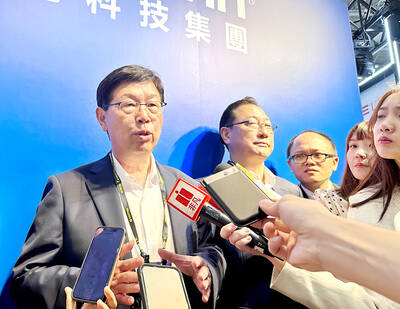Phison Electronics Corp (群聯) yesterday posted 5.32 percent annual growth in net profit for last year after significant growth in higher-margin memory products for mobile phones.
Gross profit soared 62 percent annually to a record of NT$3.48 billion (US$115.16 million) last quarter, the NAND flash memory controller supplier said in a statement.
That brought last year’s gross profit to NT$11.15 billion, up 22 percent from NT$9.13 billion in 2018.
Combined shipments of better-margin solid-state-disc and embedded multimedia card modules for handsets last quarter grew 78 percent annually, the company said.
Net profit last year climbed to NT$4.55 billion, compared with NT$4.32 billion in 2018, the third-highest level in the company’s 20-year history. That translated into earnings per share of NT$23.05, up from NT$21.91 the prior year.
Revenue last year rose 10 percent to NT$44.69 billion after soaring 30 percent to NT$13.17 billion in the fourth quarter.
Phison Electronics’ flash memory developing arm Kingston Solutions Inc (KSI, 金士頓電子) is no longer a drag on its bottom line after the unit turned around last quarter.
It recognized a NT$345 million loss from the 33 percent-held unit in the first three quarters of last year before booking a NT$52.41 million profit from KSI last quarter, a Phison Electronics filing with the Taiwan Stock Exchange showed.
The company’s board of directors has approved the distribution of a cash dividend of NT$13 per common share, same as last year and representing a payout ratio of 56.4 percent, the company said.
That implied a 5.18 percent dividend yield based on the company’s closing price of NT$251 yesterday.
Phison Electronics chairman Pua Khein-seng (潘健成) has said that recovery in the NAND flash memory industry would continue for the remainder of this year after a brief dip this quarter due to the impact of the COVID-19 pandemic.
NAND flash memory prices are expected to pick up further next quarter, driven by new product launches from the world’s major electronics vendors, Pua said.
To cope with the upswing, Phison Electronics is increasing NAND flash memorychip orders from suppliers in the US and South Korea, he said.
Phison Electronics in January said that it plans to spend NT$1.3 billion to build a new fab in Taiwan this year to scale up its research and development team, and increase materials for high-end NAND flash products.
Construction is to begin this month.
The company’s operating expenses rose 34 percent last year as it invested in advanced technology to cope with rising demand for 5G-compatible technology, industrial devices and servers.
It is to hold an investors’ teleconference on Friday to provide detailed financial figures and its business outlook.

Taiwan Transport and Storage Corp (TTS, 台灣通運倉儲) yesterday unveiled its first electric tractor unit — manufactured by Volvo Trucks — in a ceremony in Taipei, and said the unit would soon be used to transport cement produced by Taiwan Cement Corp (TCC, 台灣水泥). Both TTS and TCC belong to TCC International Holdings Ltd (台泥國際集團). With the electric tractor unit, the Taipei-based cement firm would become the first in Taiwan to use electric vehicles to transport construction materials. TTS chairman Koo Kung-yi (辜公怡), Volvo Trucks vice president of sales and marketing Johan Selven, TCC president Roman Cheng (程耀輝) and Taikoo Motors Group

Among the rows of vibrators, rubber torsos and leather harnesses at a Chinese sex toys exhibition in Shanghai this weekend, the beginnings of an artificial intelligence (AI)-driven shift in the industry quietly pulsed. China manufactures about 70 percent of the world’s sex toys, most of it the “hardware” on display at the fair — whether that be technicolor tentacled dildos or hyper-realistic personalized silicone dolls. Yet smart toys have been rising in popularity for some time. Many major European and US brands already offer tech-enhanced products that can enable long-distance love, monitor well-being and even bring people one step closer to

RECORD-BREAKING: TSMC’s net profit last quarter beat market expectations by expanding 8.9% and it was the best first-quarter profit in the chipmaker’s history Taiwan Semiconductor Manufacturing Co (TSMC, 台積電), which counts Nvidia Corp as a key customer, yesterday said that artificial intelligence (AI) server chip revenue is set to more than double this year from last year amid rising demand. The chipmaker expects the growth momentum to continue in the next five years with an annual compound growth rate of 50 percent, TSMC chief executive officer C.C. Wei (魏哲家) told investors yesterday. By 2028, AI chips’ contribution to revenue would climb to about 20 percent from a percentage in the low teens, Wei said. “Almost all the AI innovators are working with TSMC to address the

FUTURE PLANS: Although the electric vehicle market is getting more competitive, Hon Hai would stick to its goal of seizing a 5 percent share globally, Young Liu said Hon Hai Precision Industry Co (鴻海精密), a major iPhone assembler and supplier of artificial intelligence (AI) servers powered by Nvidia Corp’s chips, yesterday said it has introduced a rotating chief executive structure as part of the company’s efforts to cultivate future leaders and to enhance corporate governance. The 50-year-old contract electronics maker reported sizable revenue of NT$6.16 trillion (US$189.67 billion) last year. Hon Hai, also known as Foxconn Technology Group (富士康科技集團), has been under the control of one man almost since its inception. A rotating CEO system is a rarity among Taiwanese businesses. Hon Hai has given leaders of the company’s six